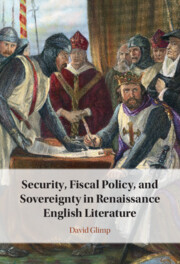Refine search
Actions for selected content:
361 results
19 - English Kingship in a European Context
- from Part V - Reflection
-
-
- Book:
- The Cambridge Companion to Late Medieval English Kingship
- Published online:
- 03 November 2025
- Print publication:
- 20 November 2025, pp 401-422
-
- Chapter
- Export citation
5 - Finance
- from Part II - Kingship in Practice
-
-
- Book:
- The Cambridge Companion to Late Medieval English Kingship
- Published online:
- 03 November 2025
- Print publication:
- 20 November 2025, pp 89-108
-
- Chapter
- Export citation
7 - The Welfare State
-
- Book:
- States of Transition
- Published online:
- 31 October 2025
- Print publication:
- 13 November 2025, pp 158-184
-
- Chapter
- Export citation
Taxing your cake and growing it too: public beliefs on the dual benefits of progressive taxation
-
- Journal:
- Journal of Public Policy , First View
- Published online by Cambridge University Press:
- 11 November 2025, pp. 1-20
-
- Article
-
- You have access
- Open access
- HTML
- Export citation

Self-Made
- The Stories That Forged an American Myth
-
- Published online:
- 30 October 2025
- Print publication:
- 30 October 2025
2 - Value in Motion: The Inheritance of Merchant Capital and Debates over Credit
-
- Book:
- The Capitalist Self
- Published online:
- 12 October 2025
- Print publication:
- 30 October 2025, pp 57-100
-
- Chapter
- Export citation
10 - The Emergence of Local Bankers in England: Savings and Adam Smith’s ‘Capitalism’
-
- Book:
- The Capitalist Self
- Published online:
- 12 October 2025
- Print publication:
- 30 October 2025, pp 391-411
-
- Chapter
- Export citation
7 - Language, Law and Religion
-
-
- Book:
- Palmyra, the Mediterranean and Beyond
- Published online:
- 21 October 2025
- Print publication:
- 16 October 2025, pp 141-166
-
- Chapter
- Export citation
2 - The Consolidation of Ethnicity in the Niger Delta
-
- Book:
- Minority Identities in Nigeria
- Published online:
- 26 September 2025
- Print publication:
- 16 October 2025, pp 60-95
-
- Chapter
- Export citation
1 - “Active Methods of Showing Dislike”
-
- Book:
- Minority Identities in Nigeria
- Published online:
- 26 September 2025
- Print publication:
- 16 October 2025, pp 28-59
-
- Chapter
-
- You have access
- HTML
- Export citation
Pollution versus inequality: tradeoffs for fiscal policy
-
- Journal:
- Macroeconomic Dynamics / Volume 29 / 2025
- Published online by Cambridge University Press:
- 15 October 2025, e150
-
- Article
-
- You have access
- Open access
- HTML
- Export citation
Chapter 4 - Sovereignty and Security Dilemmas in William Shakespeare’s History Plays
-
- Book:
- Security, Fiscal Policy, and Sovereignty in Renaissance English Literature
- Published online:
- 04 September 2025
- Print publication:
- 18 September 2025, pp 92-126
-
- Chapter
- Export citation
Chapter 3 - Marlowe’s Treasuries
-
- Book:
- Security, Fiscal Policy, and Sovereignty in Renaissance English Literature
- Published online:
- 04 September 2025
- Print publication:
- 18 September 2025, pp 58-91
-
- Chapter
- Export citation

Security, Fiscal Policy, and Sovereignty in Renaissance English Literature
-
- Published online:
- 04 September 2025
- Print publication:
- 18 September 2025
Taxation without public service: Tianjin meat safety regulation in the Republican era
-
- Journal:
- International Journal of Asian Studies , First View
- Published online by Cambridge University Press:
- 03 September 2025, pp. 1-20
-
- Article
-
- You have access
- Open access
- HTML
- Export citation
Capitalism and the Semiotics of Corporate Personhood in a Law of Human Persons
-
- Journal:
- Signs and Society / Volume 13 / Issue 3 / September 2025
- Published online by Cambridge University Press:
- 15 August 2025, pp. 355-376
-
- Article
-
- You have access
- Open access
- HTML
- Export citation
Chapter 1 - Depopulation, Debt, and Distrust
-
- Book:
- Time and Governance in Fifteenth-Century Perpignan
- Published online:
- 26 July 2025
- Print publication:
- 14 August 2025, pp 11-38
-
- Chapter
- Export citation
7 - Military finance, organisation, and state development, 1450–1650
-
-
- Book:
- The Cambridge History of War
- Published online:
- 18 July 2025
- Print publication:
- 14 August 2025, pp 191-204
-
- Chapter
- Export citation
Taxation and Social Intermediaries: Experimental Evidence from Lagos, Nigeria
-
- Journal:
- British Journal of Political Science / Volume 55 / 2025
- Published online by Cambridge University Press:
- 01 August 2025, e99
-
- Article
-
- You have access
- Open access
- HTML
- Export citation
6 - Financial Administration, Market, and Merchants
- from Text 6 - Regulating Markets and Government Grain Purchases
-
-
- Book:
- Chinese Statecraft
- Published online:
- 17 July 2025
- Print publication:
- 31 July 2025, pp 96-112
-
- Chapter
- Export citation
